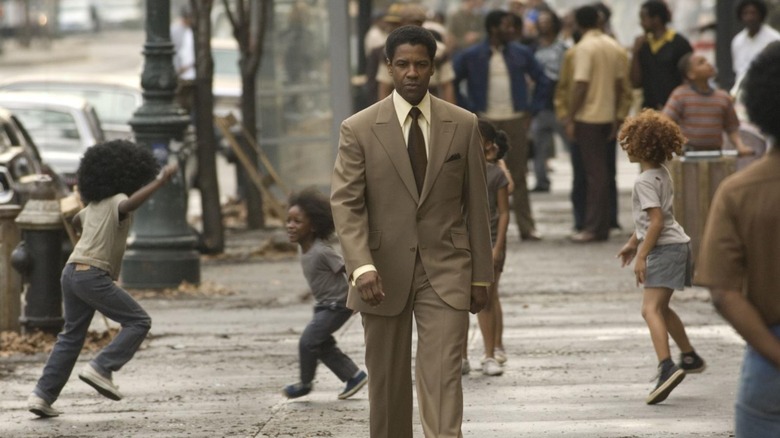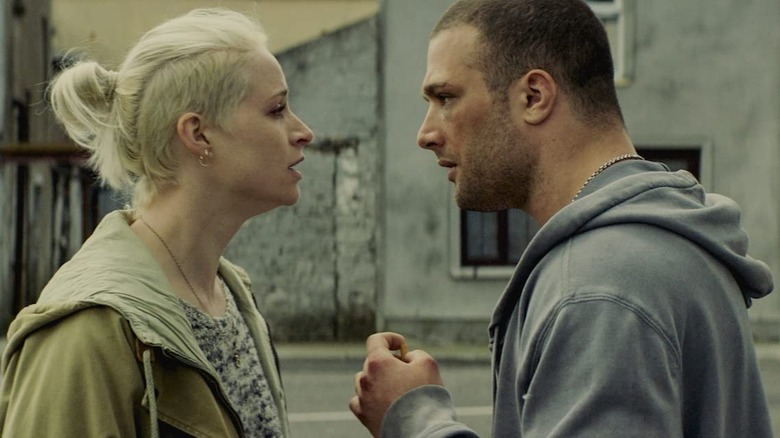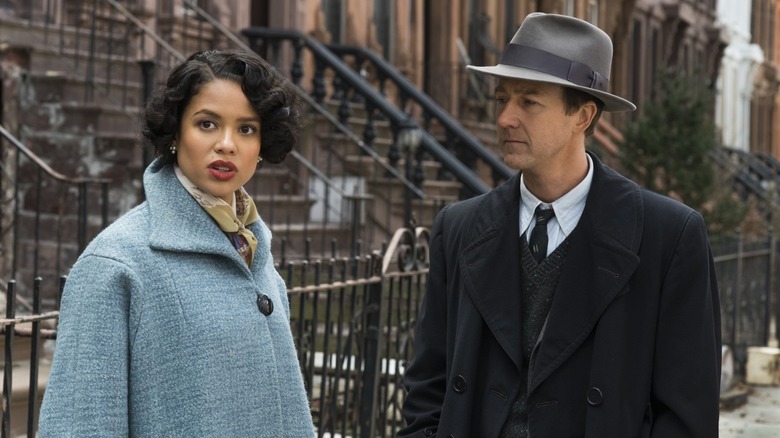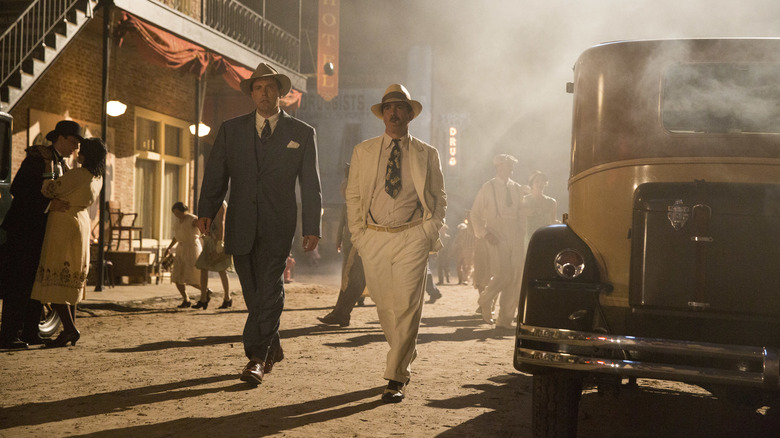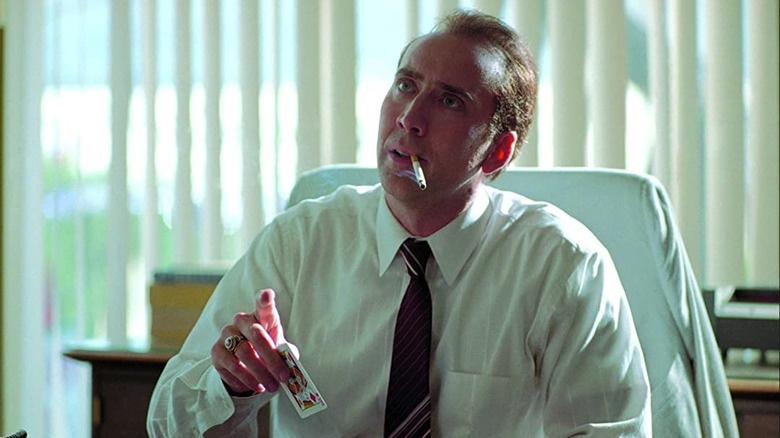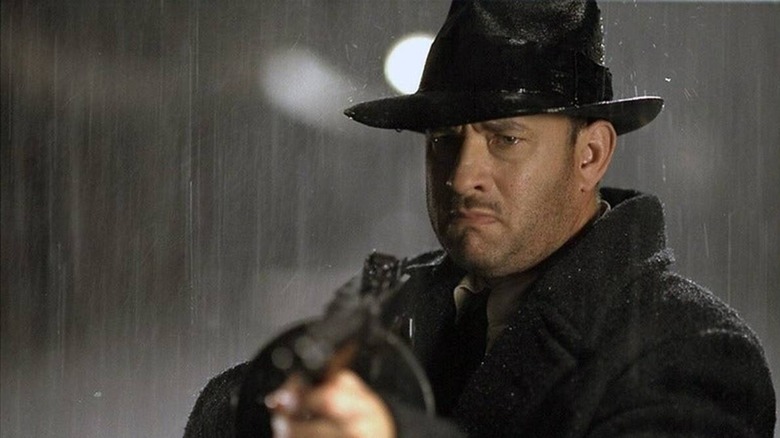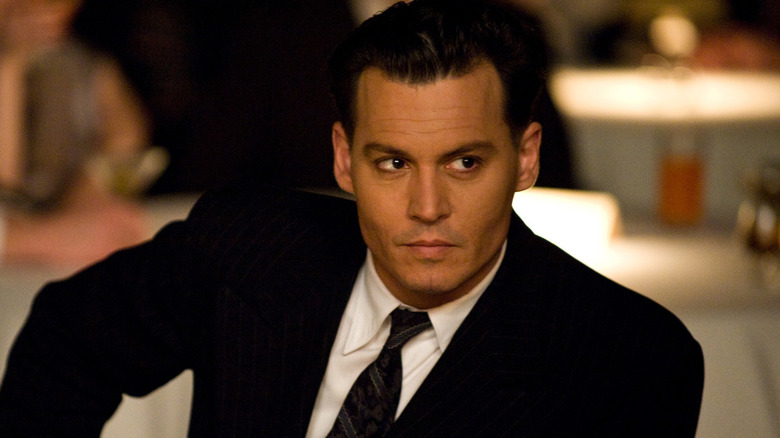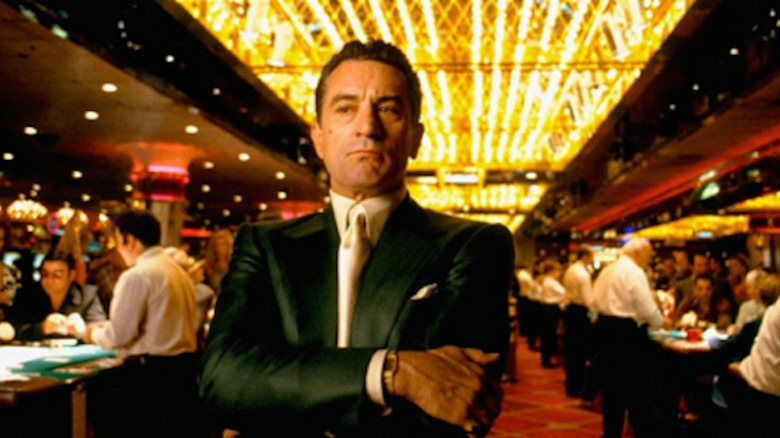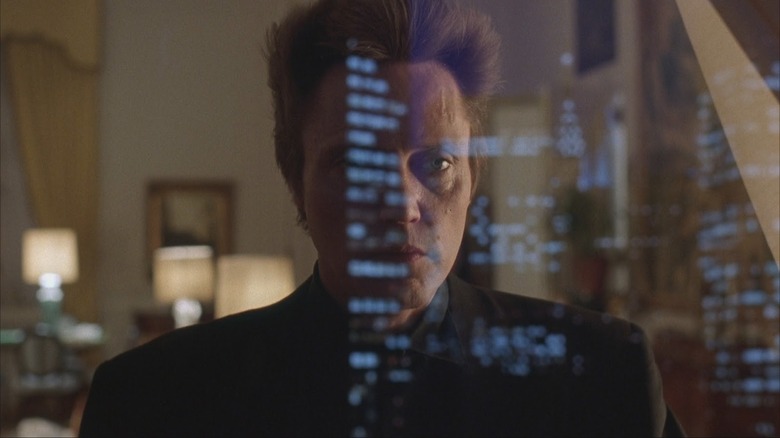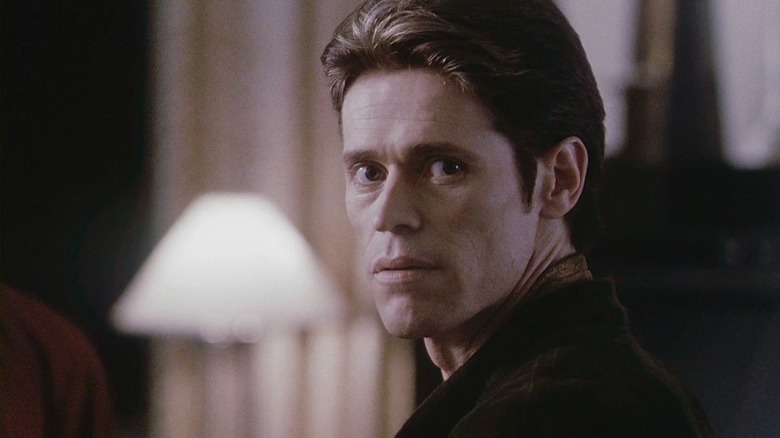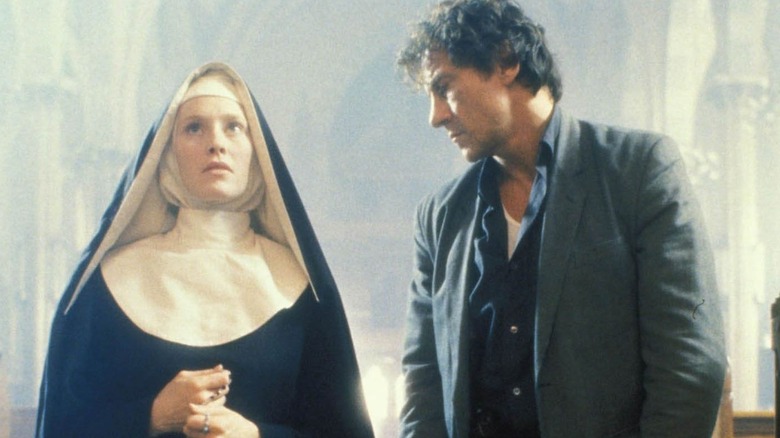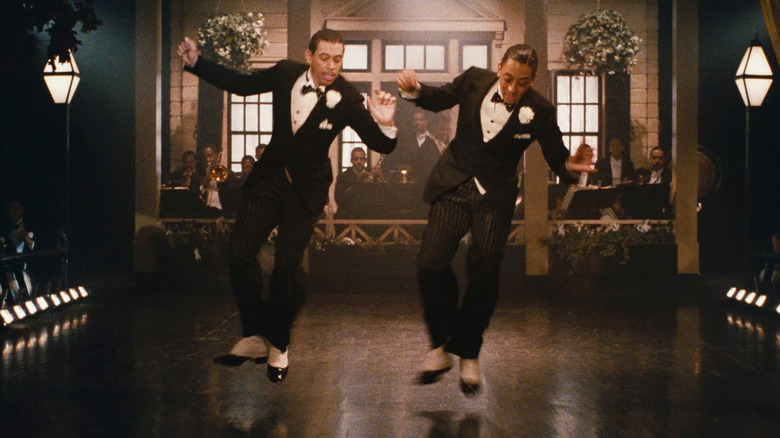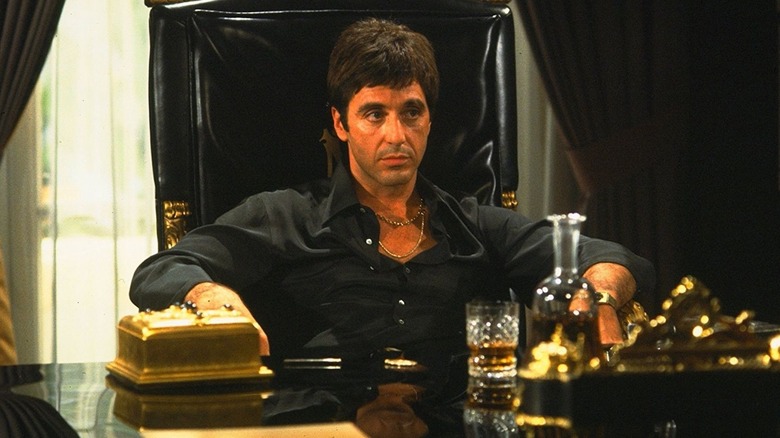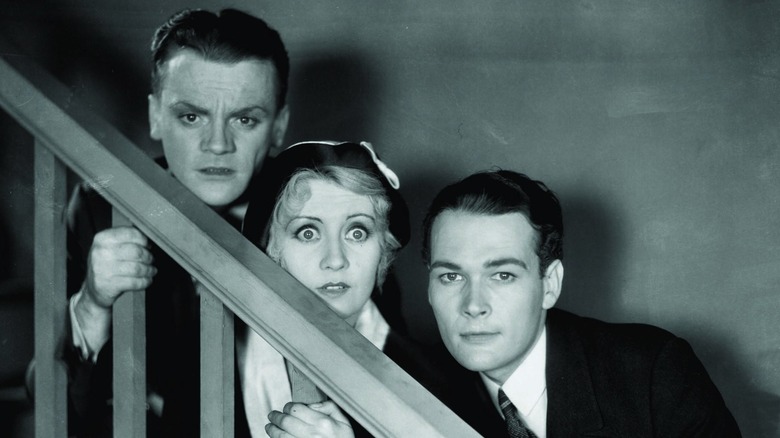Movies Like American Gangster You Definitely Need To See
Ridley Scott debuted not just one, but two big-budget, star-studded vehicles this year with "The Last Duel" and "House of Gucci," both of which were released within a month of each other. Scott is one of the most prolific filmmakers of his generation, and "American Gangster" stands as one of his very best films. The 157-minute crime epic was a throwback to classic films that explored the lives of both cops and criminals in nearly equal measure. It spotlighted real events and public figures some audiences may not have been familiar with.
The film centers on the rise and fall of Frank Lucas (Denzel Washington), the notorious New York gangster who smuggled drugs from Thailand throughout the Vietnam War. Lucas was a prominent black gangster amidst the Italian mafia, and that distinction allowed him to avoid authorities for decades. Russel Crowe portrays Richie Roberts, the dedicated NYPD officer who eventually brings him to justice. The film explores racism and police corruption.
"American Gangster" is a great watch for crime movie buffs, but make sure to check out these other great films, as well.
Calm With Horses
In "American Gangster," Frank Lucas is forced to enter the criminal world due to the nature of his circumstances. While he certainly commits crimes that can make him come across as unlikeable, Lucas is initially sympathetic because of his poor upbringing and troubled personal relationships. He frequently encounters racism, and his criminal operations help to support his community when they are targeted by the NYPD. Despite his ruthless nature, Lucas becomes a strange sort of local hero as he funnels his earnings back into black-owned businesses.
In other words, "American Gangster" made the case for sympathizing with a criminal, and the 2019 Irish crime thriller "Calm With Horses" makes its criminal characters similarly relatable. It follows the ex-boxer Douglas Armstrong (Cosmo Jarvis), also known as "Arm," a low-ranking enforcer with the Devers crime family who is promoted abruptly after several other members are killed. Arm is fearsome in carrying out the instructions of his superiors, but is uncomfortable taking a life. He's placed in an unwinnable situation when he's asked to kill for the first time: He can either risk his family's safety by refusing the orders ... or sacrifice his humanity by murdering a rival in cold blood.
Like Washington, Jarvis delivers an empathetic performance. He struggles to care for his family amidst a poor working environment, and is pushed to embrace his darker qualities by his hot-headed partner Dymphna (Barry Keoghan). Arm's son suffers from autism and doesn't receive proper health care, making his plight even more emotional.
Motherless Brooklyn
New York is often the setting for crime movies, but the epic nature of "American Gangster" allowed Scott to examine the city's development and history over time. Lucas watches the city he grew up in evolve and change, for both better and worse. Black-owned businesses gain more prominence, but the streets get more violent and police brutality skyrockets. The Vietnam War creates even more political turmoil, but despite these grievances, there is still beauty. "American Gangster" is both a love letter and a critical study of the city that never sleeps.
Edward Norton's 2019 mystery epic "Motherless Brooklyn" also explored the history of New York's development within a historical setting. Based on the 1999 novel by Jonathan Lethem, "Motherless Brooklyn" follows the idiosyncratic private investigator Lionel Essrog (Norton), who explores a scandal at the heart of New York's infrastructure development. Lionel suffers from Tourette's syndrome and OCD, but has an incredible memory and strong investigative skills. The death of Lionel's mentor, Frank (Bruce Willis), draws him into a mystery involving the mafia and an urban housing deal. He falls in love with the jazz singer Laura Rose (Gugu Mbatha Raw).
Like Scott, Norton plays close attention to the period details, crafting a gorgeous vision of New York in the 1950s. Although the original novel was set in the modern-day, Norton's period setting was a perfect first for the noir storyline.
Live by Night
"American Gangster" was a refreshing throwback to old-fashioned crime movie epics. While more modern neo-noir films have taken the genre in new and more focused directions, it was nice to luxuriate in the rise and fall of a prominent criminal within history. The nearly three-hour runtime was an appropriate length, as it allowed Scott to pack the film with even more insight into Lucas's life.
It's nice to see this nostalgic take on the genre re-energized through a modern perspective, and Ben Affleck did something very similar with his 2016 effort "Live By Night." Affleck was already a crime movie aficionado thanks to his work on the neo-noir "Gone Baby Gone" and heist thriller "The Town," but he opted to tell a period story that focused on the early days of the bootlegging business. Like Scott, Affleck poured extensive detail into accurately capturing the period-specific details.
Joe Coughlin (Affleck) is a disgraced World War I veteran who embarrasses his Boston police captain father, Thomas (Brendan Gleason), due to his involvement in a series of bank robberies. Joe falls for the mysterious singer Emma Gould (Sienna Miller), but learns that she's also dating the ruthless gangster Albert White (Robert Glenister). Joe is forced to abandon his hometown of Boston and begin a bootlegging operation in Tampa, Florida. Coughlin forms alliances with local Cuban business dealers, but comes into conflict with religious extremists and the Klu Klux Klan.
Matchstick Men
Ridley Scott is a very versatile filmmaker who's well known for his work within many different genres. It's impressive when a director establishes themselves within a certain genre or era, but Scott has a diversity to his projects that makes him consistently exciting. While his science fiction films "Alien," "Blade Runner," and "The Martian" are largely considered to be his masterpieces, Scott was no stranger to crime movies when he debuted "American Gangster."
2002's "Matchstick Men" is one of Scott's very best films, and like "American Gangster" it explored a slightly more sympathetic take on the cinematic criminal. The film follows con artist Roy Waller (Nicolas Cage), who deceives elderly citizens with insurance scams alongside his partner, Frank Mercer (Sam Rockwell). Waller suffers from severe Tourette's syndrome and obsessive-compulsive disorder, experiencing frequent bouts of depression and panic attacks. He's forced to take on more responsibility when he's tasked with taking care of his teenage daughter, Angela (Alison Lohman).
Angela is a great gateway character that helps introduce the audience to Waller's daily life. She begins helping him in his con schemes, as her youthfulness helps make him seem more compelling. Like Lucas, Waller does a lot of the right things for the wrong reasons, and he develops his maturity throughout as he becomes more responsible. Cage enjoys exploring quirky and idiosyncratic characters, and Scott is able to ground his signature qualities within a compelling story that justifies them.
Road to Perdition
"American Gangster" told a more humane crime story through its incorporation of familial storylines. Frank Lucas' criminal profession has a profound impact on his wife and children, even as he considers himself to be a "family man." Lucas employs his brother Huey (Chiwetel Ejiofor) as his right-hand man, and he uses the acquired funds to support his mother (Ruby Dee). As a result of his dedication, Lucas is vulnerable, and the pursuing legal authorities target his family as they attempt to gather evidence to convict him.
Sam Mendes' 2002 gangster epic "Road to Perdition" explored similar themes of the cost that the criminal life has on family relationships. Based on the beloved graphic novel, the film centers around the Irish mob enforcer Michael Sullivan (Tom Hanks), who attempts to escape the clutches of his superiors and provide a better life for his son, Michael Sullivan Jr. (Tyler Hoechlin). Sullivan's boss (Paul Newman) is the ruthless head of the family who raised Sullivan and considers himself a father figure. Rooney is only disappointed in his own son, Connor (Daniel Craig).
Similar to Washington, Hanks broke from his typical persona to play a more violent and dangerous character who is still sympathetic. Sullivan acknowledges the horrible things he's done, and while he doesn't seek to make amends for his past actions, he hopes his son will never have to do the same thing.
Public Enemies
One of the reasons "American Gangster" was so entertaining was that it told the story from the perspective of both the cops and criminals: Frank Lucas is struggling to care for his extended family's excesses and indulgences as he expands his operations, while Richie Roberts is in the middle of a divorce and custody case, struggling to connect with his young son. Lucas isn't respected by other gangsters because of the color of his skin, and Roberts's nobility is a novelty within the corrupt police force. When the two cross paths and go up against each other, the audience is forced to choose between two sympathetic characters.
Crime movie genius Michael Mann delivered a similar tale with his 2009 gangster epic, "Public Enemies." Based on a true story, the film follows notorious bank robber John Dillinger (Johnny Depp) as he's pursued by an elite FBI task force led by Special Agent Melvin Purvis (Christian Bale). There's time taken to explore Dillinger's relationship with his men, and how his wife (Marion Cotillard) becomes roped into the investigation. Dillinger sees himself as a Robin Hood-esque hero, and he's lauded by the media.
Bale shows how this affects Purvis, as he's tasked with taking down this popular culture figure. Meticulous and diligent, Purvis is a relatable good cop who seeks out Dillinger only to stop the violence.
Casino
The gangster movie genre owes a lot to Martin Scorsese, who was one of the earliest filmmakers to truly capture the way that real mafia figures interacted. Scorsese's earlier films "Mean Streets" and "Goodfellas" are regarded as classics, but 1995's "Casino" is somewhat undervalued within the director's filmography. It's unfortunate, because "Casino" is a brilliant depiction of real events. It's also very similar to "American Gangster." Scorsese and Scott are both filmmakers who can make extremely long movies entertaining throughout, and "Casino" justifies its epic three-hour runtime.
The film depicts the life of Jewish gambling expert Sam Rothstein (Robert De Niro), who grows from his low ranking status to become the guy running the Tangiers Casino in Las Vegas, fronted by the Chicago mafia. Sam is aided in the role via the unstable friendship he shares with the mafia's "made man" Nicky Santoro (Joe Pesci), who helps him gain respect he wouldn't receive otherwise because of his Jewish heritage. However, Nicky is also temperamental and prone to fits of violence that Sam cannot control. He's forced to constantly be second guessing Nicky's motivations as he manages the tight daily operations.
Like Lucas, Sam is also caught in a challenging romantic relationship that ends up making him more vulnerable. Sam becomes involved with hustler Ginger McKenna (Sharon Stone), and the two initially attempt to raise a daughter together despite their dangerous lifestyle. Ginger is unpredictable and wreaks havoc on Sam's life, and Stone received an Academy Award nomination for best actress.
King of New York
New York City felt like a real character in "American Gangster," and so much about the city shapes Lucas's worldview as he enters the global arena. He's raised in a difficult environment where resources are scarce, protective of his hometown, proud of Harlem's growth, and makes efforts to improve the city's infrastructure as he grows older.
Abel Ferrara's 1990 neo-noir crime epic "King of New York" played with a similar concept. The film follows an aging drug lord, Frank White (Christopher Walken), who is released from the Sing Sing Correctional City after a nearly lifelong sentence. White is anxious to return to the city he loves, but he's almost immediately drawn into another violent conspiracy: The murder of a South Columbian drug dealer on the day of White's release prompts increased attention from the NYPD, and White is forced to manage the perpetual violence of his right-hand men Jimmy Jump (Laurence Fishburne) and Test Tube (Steve Buscemi). Detective Tommy Flanigan (Wesley Snipes) doubts White's claims of innocence, and seeks to make him public enemy number one.
Both Lucas and White struggle to manage an increasingly complex series of alliances and allies. White, in particular, becomes overwhelmed by how drastically the mafia scene has changed since his release. He knows that he needs to manage those under his control in order to stay safe, but he becomes increasingly paranoid about his ability to do so.
Light Sleeper
"American Gangster" does not paint a flattering portrayal of the criminal lifestyle. Despite his indulgences, Frank Lucas is crippled by the stresses of the job as he grows older, and Ridley Scott was empathetic to the challenges Lucas faces as he reaches the point where it would be impossible to conform to a normal life.
The theme of the criminal lifestyle being all-consuming is one that Paul Schrader tackled with his 1992 neo-noir thriller "Light Sleeper." The film follows the downward spiral of the New York drug dealer John LeTour (Willem Dafoe), who grows increasingly unstable as his insomnia increases. He's placed in constant danger, and stressed by his demanding clientele, which includes the wealthy upper class of the city. While John attempts to reconnect with his ex-wife, Marianne Jost (Dana Delaney), she believes he's already a lost cause. The only somewhat stable relationship John has is the one with his leading client, Ann (Susan Sarandon), who distributes his drugs to her network.
Like Scott, Schrader paints New York with meticulous detail and subverts the familiar sites of the city into a terrifying nightmare as John's descent into madness grows more severe. Dafoe delivers a terrific performance, and captures a sensitivity within the vile character.
Bad Lieutenant
"American Gangster" had a surprisingly nuanced depiction of law enforcement, as it explored a more complex depiction of police corruption and morality than most crime thrillers. Roberts is haunted by the challenges of his profession, as it takes a toll on his mental health as he struggles to retain his good nature within a force that frequently takes bribes and abuses innocent civilians. Roberts is hardly straight-laced, but he's contrasted with the vile Detective Trupo (Josh Brolin).
Crime thrillers often lionize the duties of law enforcement, but "American Gangster" showed examples of both good and bad cops. Abel Ferrara's 1992 neo-noir crime movie classic "Bad Lieutenant" seeked to explore a similar dichotomy; the unnamed protagonist (Harvey Keitel) is addicted to drugs and abandons all procedural requirements. He's desensitized and corrupt, but his skills end up being essential to solving the case of a nun's assault. Keitel delivers a powerful, no holds barred performance.
The Cotton Club
One element that made "American Gangster" so effective was its depiction of the passage of time, and how Frank Lucas's operations change due to the different eras and world events that occur throughout his life. Ridley Scott is one of the rare filmmakers who can craft a true cinematic epic, and no gangster movie epic is more iconic than Francis Ford Coppola's "The Godfather" trilogy. While the story of the Corleones is by far the most famous work of Coppola's career, his 1984 crime epic "The Cotton Club" deserves another look from crime movie buffs.
The film follows the development of the titular Harlem jazz club throughout the 1930s and its intersections with the mafia. The musician Dixie Dwyer (Richard Gere) has ties to the mob, but he also tries to support the local jazz scene once he falls in love with the singer Vera Cicero (Diane Lane). Like Lucas, Dixie is forced to deal with a hot-headed brother — the aggressive Vincent (Nicolas Cage), who creates chaos within an already-temperamental environment.
Scarface
"American Gangster" played fast and loose with real events, but it was a compelling look at the life of Frank Lucas and how he earned his reputation. Known as the most successful black gangster in history, Lucas was a legend in his own time, and "American Gangster" showed insight into how he earned that status. Lucas is never a completely likable character, but "American Gangster" certainly humanizes him.
Brian De Palma explored a similar notorious gangster character with his 1983 biopic "Scarface," which starred Al Pacino as the famous Cuban refugee Tony Montana, who enters the United States through Miami and amasses one of the most powerful cocaine businesses in history. While it wasn't the first time that the Montana story had been told onscreen (the film replicates elements from the 1932 film of the same name), De Palma's highly controversial remake had more personality thanks to Pacino's eccentric performance.
The Public Enemy
When examining crime movies like "American Gangster," it's important to recognize the classic films that preceded it. Renowned gangster movie classics like "The Godfather" and "Goodfellas" are beloved today, but they were hardly the first films to spotlight the criminal lifestyle. The genre traces back even further, and 1930s films within the pre-Code era were integral to the development of the genre. It was particularly bold for filmmakers to offer more sympathetic looks at criminals when sound cinema was just emerging.
1931's "The Public Enemy" is one of these early classics that "American Gangster" fans may appreciate. James Cagney delivers one of his most defining performances as the prohibition-era gangster Tom Powers. Like "American Gangster," "The Public Enemy" shows the circumstances that force Powers into his lifestyle. He comes from humble beginnings, and only gradually grows an aptitude for violence. It was interesting to see a film tackle the issues of prohibition as they occurred in real life.
